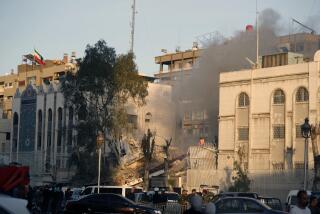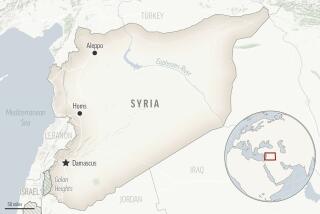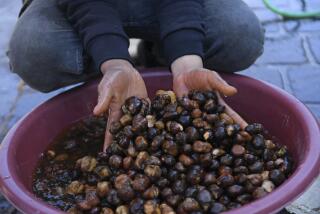Syria, rebels blame each other for reported poison gas attack
BEIRUT — Each side in the Syrian conflict blamed the other Saturday for an alleged poison gas attack that reportedly injured scores of civilians in the central province of Hama.
There was no independent confirmation of a chemical strike, which reportedly hit the village of Kfar Zeita, an agricultural center northwest of the provincial capital, Hama. Fierce clashes between rebel and loyalist forces have been reported in the area.
Various pro-opposition accounts said a government air raid Friday in Kfar Zeita included bombardment with an unspecified chemical agent, causing choking and suffocation among scores of residents.
But state-run television said Al Qaeda-affiliated Al Nusra Front, a major rebel faction, unleashed toxic chlorine gas on the village, news agencies said. State TV said two people were killed and more than 100 injured, the agencies reported.
The reports are the latest in a series of allegations of poison gas deployment in the more than 3-year-old Syrian conflict. The issue of chemical weapons use has been among the most incendiary charges to emerge from the civil war.
Reports of chemical warfare have been shrouded in uncertainty and become part of the raging propaganda campaigns waged by both sides. The inaccessibility of the battlefield to journalists and independent observers has made it impossible to confirm the competing allegations.
The Syrian government has accused rebels of conducting chemical strikes in a coordinated effort to draw international outrage and spur foreign intervention in the conflict. Syrian officials have called the reported strikes acts of desperation as fractious rebel forces face mounting losses on the battlefield.
Opposition activists have denied deploying chemical weapons and say it is the government that has repeatedly used poison gas against civilians.
The most notorious incident occurred Aug. 21 in the suburbs of Damascus, the capital. Hundreds of people were killed when the nerve agent sarin was released at various sites, according to a United Nations investigation. The U.N. did not assign responsibility.
The opposition, backed by the United States and its allies, blamed the Syrian government for the Aug. 21 poison gas onslaught. Syrian officials and their allies, including Russia and Iran, said rebels had staged the strike to spur foreign intervention in the conflict.
But no conclusive evidence has emerged indicating who was behind the attack.
U.S. airstrikes in response to the gas attacks were averted at the eleventh hour when Syria agreed to give up its chemical weapons stockpiles under a U.N.-approved plan and timetable. The Syrian government continues to deny having deployed chemical weapons.
Syrian officials are struggling to meet a June 30 deadline to ship the nation’s chemical weapons stockpiles out of the country for destruction as part of a U.N.-backed disarmament process. Syrian authorities have cited security concerns and rebel attacks for several missed deadlines. Syria has shipped out about half of its former chemical arsenal, the U.N. says.
The controversy about the August sarin gas attacks was reignited this month when a well-known U.S. journalist, Seymour Hersh, wrote an article in the London Review of Books alleging that Turkish officials — staunch backers of the Syrian rebels — helped mount the assault in an effort to force U.S. airstrikes. Turkish officials denied the charge.
Special correspondent Nabih Bulos in Amman, Jordan, contributed to this report.
More to Read
Start your day right
Sign up for Essential California for news, features and recommendations from the L.A. Times and beyond in your inbox six days a week.
You may occasionally receive promotional content from the Los Angeles Times.






